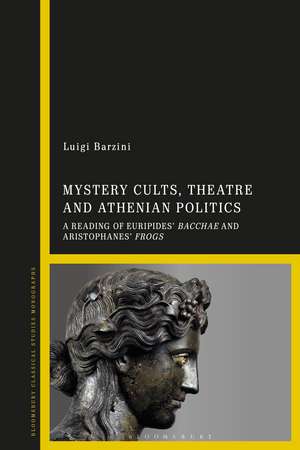Mystery Cults, Theatre and Athenian Politics: A Reading of Euripides' Bacchae and Aristophanes' Frogs
Autor Luigi Barzinien Limba Engleză Paperback – 22 feb 2023
| Toate formatele și edițiile | Preț | Express |
|---|---|---|
| Paperback (1) | 192.36 lei 6-8 săpt. | |
| Bloomsbury Publishing – 22 feb 2023 | 192.36 lei 6-8 săpt. | |
| Hardback (1) | 472.27 lei 3-5 săpt. | +29.94 lei 4-10 zile |
| Bloomsbury Publishing – 11 aug 2021 | 472.27 lei 3-5 săpt. | +29.94 lei 4-10 zile |
Preț: 192.36 lei
Preț vechi: 249.92 lei
-23% Nou
Puncte Express: 289
Preț estimativ în valută:
36.81€ • 38.29$ • 30.39£
36.81€ • 38.29$ • 30.39£
Carte tipărită la comandă
Livrare economică 15-29 aprilie
Preluare comenzi: 021 569.72.76
Specificații
ISBN-13: 9781350187399
ISBN-10: 1350187399
Pagini: 280
Ilustrații: 1 bw illus
Dimensiuni: 156 x 234 x 25 mm
Greutate: 0.39 kg
Editura: Bloomsbury Publishing
Colecția Bloomsbury Academic
Locul publicării:London, United Kingdom
ISBN-10: 1350187399
Pagini: 280
Ilustrații: 1 bw illus
Dimensiuni: 156 x 234 x 25 mm
Greutate: 0.39 kg
Editura: Bloomsbury Publishing
Colecția Bloomsbury Academic
Locul publicării:London, United Kingdom
Caracteristici
The first comparative reading of Euripides' Bacchae and Aristophanes' Frogs to focus specifically on their religious, ethical and political content
Notă biografică
Luigi Barzini is an independent scholar based in the UK.
Cuprins
IntroductionAcknowledgements DefinitionsPart One: Summary and Context 1. The Plays, the Eleusinian and Great Dionysia Festival2. Mysteries and Mystical Initiation in Athens3. Initiates and Theatre Audiences in Athens4. Mystery Rituals and Theatre Performances5. The Polis, Mystery Cults and Civic Ideology6. Historical Context and Episodes Part Two: The Plays 7. The Plays and Scholarship8. Politics in the Plays 9. Mystery Cults and the Choruses10. Political ImplicationsConclusionsNotes Bibliography Index
Recenzii
This study is an intriguing juxtaposition of plots, both involving the role of Dionysus and the Ancient Mysteries in two tragedies. Barzini makes a comparative reading of Euripides' Bacchae and Aristophanes' Frogs and focuses on their religious, ethical and political content.
